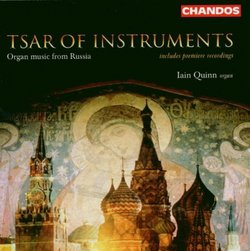| All Artists: Iain Quinn Title: Tsar of Instruments Members Wishing: 0 Total Copies: 0 Label: Chandos Original Release Date: 1/1/2003 Re-Release Date: 2/25/2003 Genres: Soundtracks, Classical Styles: Chamber Music, Historical Periods, Classical (c.1770-1830) Number of Discs: 1 SwapaCD Credits: 1 UPC: 095115104323 |
Search - Iain Quinn :: Tsar of Instruments
 | Iain Quinn Tsar of Instruments Genres: Soundtracks, Classical
|
Larger Image |
CD Details |
CD ReviewsSturmohzny und dranginshky Jdaniel1371 | Sacramento, CA United States | 06/02/2003 (4 out of 5 stars) "Russia isn't known for its organ literature, though there aren't many great
organs in the country to inspire. Where did they all go? Well. In the early eighteenth century the Eastern Orthodox Church got bitten by the iconoclast bug and proclamated a "ukase" instructing that musical instruments were to be broken and burned-and this included church organs. No more organs, nyet, nyet nyet. So one by one these instruments of supposed "mass" destruction were destroyed. (Some organs survived in civic centers and pre-revolutionary country homes).In the early 1860's when formal music conservatories were established in the country, Anton Rubinstein and his brother Nikolai, being typically annoying liberal academic types, said, "Look, if the Church is going to deny the centrality and relevance of the organ in spiritual life, then it's up to us to build replicas in our schools and show the children of Russia how to use them." The Church scoffed: "So you're going to show young and impressionable students where the "swell" button is and then expect them not to push it when no one is looking, or before they're ready?"For better or worse, from the late 1860's onward, instruction in organ playing formed part of the musical curriculum in Russia. "Tsar of Instruments" brings together occasional-and sometimes quite memorable-works by a few of Russia's more important composers.The first piece on the program, Glazunov's "Prelude and Fugue in D," op. 93, sounded disappointingly cosmopolitan and anonymous to my ears for an opener, given the dramatically "Russian" cover art of the recording. It's grand and well-proportioned but more workman-like than inspired; I didn't find the proceedings particularly memorable.After the rather underwhelming Glazunov opener, Mother Russia comes into view with Gliere's offering, "Fugue on a Russian Christmas Song". This short but delightful gem is a fugal treatment of an extremely fetching traditional melody. (Gliere is my hero of the day, BTW. I'm having a great time listening to Telarc's recent recording of his 3rd Symphony. Is the Faberman worth hunting down, being that it's on the "Uniform Dontgotta" label?).Glinka's "Three Fugues" is fine enough, showing the young composer's command of the medium, but as with the Glazunov op. 93, I was left unmoved.I'm not sure what I think of Gretchaninov yet; I've listened to hishandsomely produced "Vespers" on Hyperion a couple of times but nothing has stuck. Chandos gives us a premier recording of his "Three Pieces." Aside from the drone-like Bartokian-in-a-folksy-mood centerpiece, the meditative outer mov'ts get dangerously close to sounding "churchlady-esque." ( It should be noted that Gretchaninov has written a huge amount of music of which only a small portion has been recently recorded; maybe I've run into the misses first.)Rachmaninoff's "Andante" in F major is vintage. Written upon the death of Tchaikovsky and originally a harmonium part in the second Trio elegiaque, it 's a slow, soulful, occasionally soaring chorale-a miniature that reverberates in the memory way beyond it's 2'48" duration.Now we get to the sturmohzny und dranginshky! Glazunov's "Prelude and Fugue in Dm," dedicated to Saint Saens, really impresses, and left rings of dust on the floor in front of my subs. After a noble choral, we're treated to a highly angular hell-storming double fugue which leads into a Maestoso coda featuring deliciously wicked and surprising chord modulations-the kind of modulations with which Bruckner liked to lead into his 1st mov't codas. (Really enjoying Wand's final Bruckner 8th with the Berlin Phil these days, BTW). Mr. Iain Quinn really lets the Winchester Cathedral Organ rip in this one.Taneyev's "Choral Varie" is compelling in a variety of different ways. His Chorale, two variations, and Fughetta are garbed in a variety of orchestral colors that really show off the Winchester instrument. After the chorale which contains some delightful harmonic surprises here and there, the two variations-a canon and a basso ostinato-are highly polished but allow room for many poignant turns of phrase; something I missed in Glinka's fugues. The Fughetta cap is very satisfying.With "Credo" and "Cathedral Service" from the film "The Gadfly," we getShostakovich doing Shostakovich on the organ. It's funny how quickly one can recognize a musical personality sometimes, regardless of the instrument of ensemble. The "Credo" begins as a heavy and gloomy affair: variations above a plodding 10-note ground bass momentarily lit toward the end by a lone sunbeam-quite dramatically I might add-before receding back into the darkness.The CD ends with another very inspired Glazunov piece, his "Fantasy" Op. 110. While his "Prelude and Fugue" in D minor was a wicked romp, the "Fantasy" is a sunny meditation capped grandly by a warm but sturdy coda.If you're expecting organ music with a distinctly Russian flavor, you're not going to get it here, for the most part, so don't let the cover art get you too exited. While Rachmaninoff, Shostakovich, and Gliere provide just enough localized nourishment and soul to outline the "fertile triangle," so to speak, the majority of the dishes sound pretty cosmopolitan. No one will be notifying the waiter that there's a gadfly in the cabbage soup....So: three works of sublimity, the Rachmaninoff, Shostakovich, and the Taneyev; two gargantuan crowd-pleasers, the Glazunov's; and one little gem, the Gliere. Six out of Ten worked for me, but of course, one's mileage may vary.John Smyth Sacramento, CA" |

 Track Listings (19) - Disc #1
Track Listings (19) - Disc #1